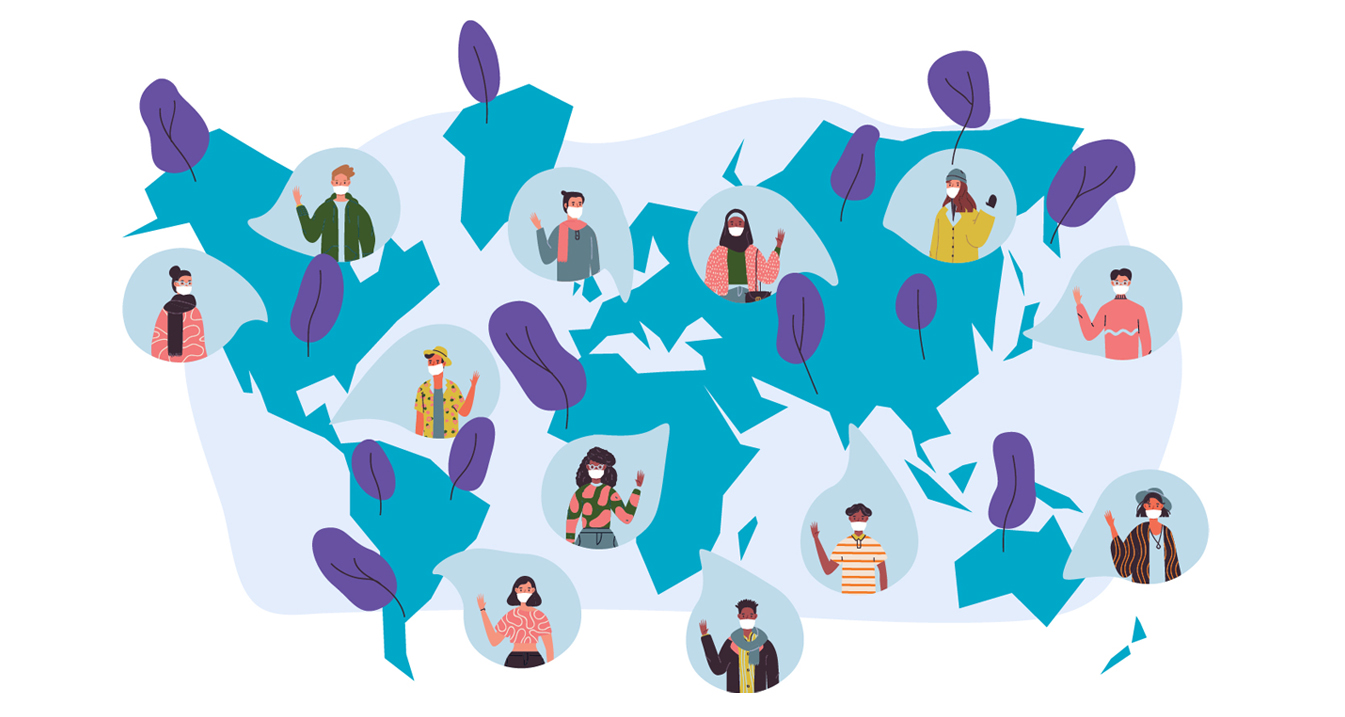
As COVID-19 continues to spread in the United States and other countries and governments work towards ‘flattening the curve’, arguments have emerged as to why some countries have dealt with the coronavirus better than others. The individualist vs collectivist dynamic has been a popular answer in providing an explanation for differences in approach. Collectivist and individualist cultures are often differentiated by the societal point of reference. While collectivist cultures tend to gravitate around the group or the ‘whole’ and encourage conformity, individualist cultures focus on the individual and the self as a priority.
Scholars like Geert Hofstede have studied different cultural dimensions and inform us as to how to understand differing responses to COVID. While we at Diversity Atlas aren’t jumping to conclusions, it’s worth thinking about what role culture plays in the mix of variables that affect different societies and government responses, and how the power of culture can affect how leaders and people perceive problems and make decisions in response to them.

Hofstede Cultural Dimensions
According to Hofstede, individualism is defined by how independent a person feels in society and the expectation that individual choices and decisions are made for each member of society. Conversely, collectivism refers to the prioritisation of the group over the individual, with a tendency to find common values and a preference for in-groups over out-groups.
Anglosphere and Western European countries like Australia, United States and Canada are generally individualistic and correlate highly towards low power distance, high uncertainty avoidance, masculinity, medium-term orientation and indulgent cultures. Confucian, South-East Asian, Islamic, African, Eastern European and South American cultures are more collectivistic, have higher power distance, lower uncertainty avoidance, a similarly masculine society, long-term orientation and more restrained cultures.
Inglehart-Welzel Cultural Map
Another model that incorporates different cultural dimensions is the Inglehart-Welzel Cultural Map derived from the World Values Survey. This model encompasses four values – traditional, secular-rational, survival and self-expression. Traditional values place emphasis on the importance of religion, parental relations, obedience to authority and traditional family values. Countries with a high score for traditional values have a higher degree of nationalism and reject divorce, abortion and euthanasia.
Secular-rational values are the opposite of traditional values and countries that rate high on the secular-rational metric find these practices acceptable. Survival values emphasise economic and physical security and is correlated with ethnocentricism and low levels of trust and tolerance. Self-expression values prioritise tolerance, LGBTQ+ equality, environmental protection, and rising demands for participation in decision-making in economic and political life.
Protection Efficacy
An article by Jim Logan at UC Santa Barbara suggested that massive social coordination, a key coping mechanism during a pandemic, may be associated with more collectivistic cultures like those in China, South Korea, Taiwan and Singapore. Researchers found that protection efficacy, the feeling that one could protect oneself from the virus, is associated with collectivism. It was found that collectivistic people, especially in the face of a perceived risk, tend to have a higher sense of efficacy, meaning that the group will act to protect individuals or the community.
Individualistic societies are conversely more isolated, socially and psychologically than collectivistic societies, which reduces the efficacy of massive social coordination. The World Health Organisation found that the two countries, China and South Korea, which responded well to the coronavirus did so through social coordination. Collectivism may be a reason why these countries performed so well.
Pathogenic Prevalence
A Forbes article by Mark Travers suggested that the expression of collectivistic or individualistic attitudes varies as a function of pathogen risk. Countries that have higher disease prevalence tend to endorse more collectivistic attitudes. It is hypothesised that social collectivism serves as a natural guard against disease transmission by proliferating specific traditions and norms that act as a buffer against pathogen transmission. Conformity, which is encouraged by social collectivism, helps to maintain these ritualised practices against disease. Historically, equatorial countries have had the highest disease prevalence and correspondingly, high correlations towards collectivism.
Collectivism produces better responses
Gad Saad writes in Psychology Today about how strategies to combat COVID-19 may be easier to implement in collectivistic societies given the custom in these cultures of following rules, edicts and norms. Allen Farrington writing for Merrion West, suggests that individualistic societies are geared towards unsustainable consumerism, intellectualise away responsibility, and are immune to shame, contributing to a tendency to disregard social distancing measures.
In an article by Riccardo Pansini at Medium, the author suggests that the Chinese collectivist model is better at coping with the virus than the Western model. He suggests that those in the West are overly fond of individual freedoms and rights, whereas those in the East are concerned with maintaining social relationships and prioritising the needs of the community, at the expense of personal rights.

Diversity Atlas COVID-19 Inclusion Survey
Given the ongoing debate about how cultural factors like individualism and collectivism contribute to differences in public health responses, we need to be attuned to cultural differences in our respective organisations. Diversity Atlas is a perfect tool for managing diversity. Cultural differences matter and organisations need to take these differences seriously. This debate is a reminder that we need to be alert to the potential that cultural differences shape how we process information and make decisions. Culture is always an ingredient in the mix of how institutions and individuals interpret the world and make decisions. Your organsation needs to be aware.
Amid the disruption, we believe this period offers opportunities for organisations to achieve more authentic staff engagement by giving individuals a chance to tell their diversity story—and Diversity Atlas gives them the tools to do just that. A shock like the one we’re experiencing now affects different people in different ways.
Diversity traits such as cultural background, age, health and disability might imply unique challenges for team members—challenges which aren’t obvious to leaders if they’re not looking for them. In the coming weeks, we will be making available our specialised COVID inclusion survey, which will give organisations insights into how the diversity of their teams creates the need for tailored inclusion strategies to make sure everybody can do their best work while working remotely.
Share this Post